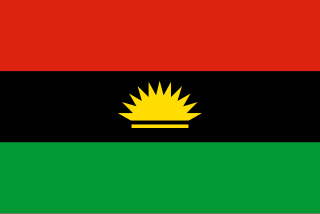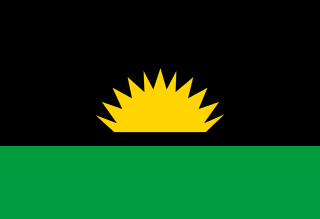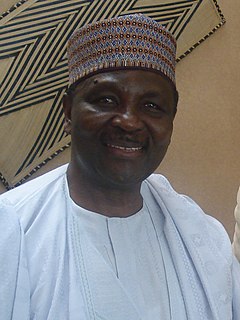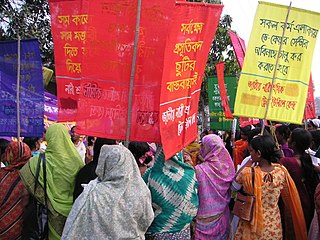Related Research Articles

Biafra, officially the Republic of Biafra, is a subsumed state in West Africa that existed from May 1967 to January 1970 and also before the creation of Nigeria by Britain. After Biafra's declaration of independence from Nigeria, Nigeria attacked Biafra with British and Soviet military support.

The Republic of Benin was an ephemeral unrecognized secessionist state in West Africa which existed for one day in 1967. It was established on 19 September 1967 during the Nigerian Civil War as a puppet state of Biafra, following its occupation of Nigeria's Mid-Western Region, and named after its capital, Benin City, with Albert Nwazu Okonkwo as its head of government. The new state was an attempt by Biafra to prevent non-Igbo residents of the neighboring Mid-Western Region from siding with Nigeria following regional ethnic tensions early in the war. The Republic of Benin was officially declared even as the Nigerian federal forces were reconquering the region and ended the following day as they entered Benin City. The occupation of the Mid-Western Region turned residents against the secessionist cause, and was used by the Nigerian government as justification to escalate the war against Biafra.

Chukwuemeka "Emeka" Odumegwu-Ojukwu was a Nigerian military officer and politician who served as the military governor of the Eastern Region of Nigeria in 1966 and the leader of the breakaway Republic of Biafra from 1967 to 1970. He was active as a politician from 1983 to 2011, when he died aged 78.

Yakubu "Jack" Gowon is a Nigerian political and military leader who served as the head of state of Nigeria from 1966 to 1975.

The Nigerian Civil War was a civil war in Nigeria fought between the government of Nigeria headed by General Yakubu Gowon and the secessionist state of Biafra led by late Lt. Colonel Odumegwu Ojukwu (1933–2011) from 6 July 1967 to 15 January 1970. Biafra represented nationalist aspirations of the Igbo people, whose leadership felt they could no longer coexist with the Northern-dominated federal government. The conflict resulted from political, economic, ethnic, cultural and religious tensions which preceded Britain's formal decolonization of Nigeria from 1960 to 1963. Immediate causes of the war in 1966 included ethno-religious violence and anti-Igbo pogroms in Northern Nigeria, a military coup, a counter-coup and persecution of Igbo living in Northern Nigeria. Control over the lucrative oil production in the Niger Delta also played a vital strategic role.

Nigeria Labour Congress (NLC) is an umbrella organization for trade unions in Nigeria.

The Movement for the Actualization of the Sovereign State of Biafra (MASSOB) is a secessionist movement in Nigeria, associated with Igbo nationalism, which supports the recreation of an independent state of Biafra. It was founded in 1999 and is led by an Indian-trained lawyer Ralph Uwazuruike, with headquarters in Okwe, in the Okigwe district of Imo State.

The Bangladesh Trade Union Centre (BTUC) is a national trade union federation in Bangladesh. On a national level, it is affiliated with the National Coordination Committee for Workers' Education and internationally with the World Federation of Trade Unions. BTUC is politically tied to the Communist Party of Bangladesh, although the federation has started to become somewhat more independent in recent years.
Trade unions in Botswana operate within a longstanding democratic system in which the government of Botswana has ratified the International Labour Organization's core conventions, including Conventions 87 and 98.
Anti-Igbo sentiment refers to the discrimination and hostility in Nigeria that exists towards Igbo people or their culture.

The Ahiara Declaration: The Principles of the Biafran Revolution, commonly known as the Ahiara Declaration, was a document written by the National Guidance Committee of Biafra and delivered as a speech by the Head of State of Biafra Emeka Ojukwu in the Biafra town of Ahiara on June 1, 1969.
The Fall of Enugu,, was a military conflict between Nigerian and Biafran forces. Enugu was invaded after the Biafran retreat from the Mid-Western Region only 14 days earlier after the Nigerian 2nd and 3rd Marine Division cleared them of the area.

Nnamdi Okwu Kanu is a British Nigerian Biafra political activist. He is the leader of the Indigenous People of Biafra (IPOB).The main aim of IPOB is to create an independent state for the people of old Eastern Region of Nigeria through referendum. Kanu is the director of a UK registered radio station named Radio Biafra. Kanu was arrested on treason charges in Lagos, Nigeria on 14 October 2015 and was detained for more than a year, despite various court orders that ruled for his release. When in court, Kanu appeared regularly wearing a Jewish prayer shawl and head covering. He said in court, that he "believes in Judaism" and considers himself a Jew and oftentimes has led his Biafran people to various Jewish prayers and religious observations. On 28 April 2017, Kanu was released from prison on bail.

The Indigenous People of Biafra (IPOB) is a Biafran separatist organization in Nigeria. Its main aim is to restore an independent state of Biafra in the former Eastern Region of Nigeria through an independence referendum. The group was founded in 2012 by Nnamdi Kanu, a British Nigerian political activist known for his prominent advocacy of the contemporary Biafran independence movement.
The 2015–2016 Killing of Biafran Protesters refers to the killing of demonstrators demanding the restoration of the sovereignty of the Republic of Biafra by Nigerian security forces, especially the Nigerian army, across the southeastern parts of Nigeria. The demonstrations are spearheaded by several secessionist groups. In addition, residents of the above-mentioned region have often been subjected to conditions synonymous with those obtainable in a Police State.

Ejike Ebenezer Obumneme Aghanya was a military officer and electrical engineer who served in the Nigerian Army and the Biafran Armed Forces, retiring as a Colonel. Accused of involvement in the 1966 Nigerian coup d'état he was arrested and imprisoned without trial until the outbreak of the Nigerian Civil War where he served on the side of Biafra, holding key positions in the Biafran Armed Forces. He was the head of the Biafran Agency for Research and Production (RAP) which produced bombs, rockets, missiles, as well as ammunition, armored vehicles, telecommunication gadgets and petroleum refineries among others for the Biafran Armed Forces. Later he was the Chief of Staff of the Biafran Organisation of Freedom Fighters (BOFF) which was the guerrilla warfare and special operations arm of the Biafran Armed Forces. He also served as Battalion Commander, 44th Electrical and Mechanical Engineer Battalion Biafran Army and later Brigade Commander of the 58th Brigade of 12th Infantry Division Biafran Army during the war.
The United Labour Congress (ULC) was a national trade union federation in Nigeria.
The Nigeria Trade Union Congress (NTUC) was a national trade union federation in Nigeria.
The Nigeria Workers' Council (NWC) was a national trade union federation in Nigeria.
The Labour Unity Front (LUF) was a national trade union federation in Nigeria.